The role of Pancasila ideology in legitimizing public policies during the COVID-19 pandemic in Indonesia
Downloads
The national ideology is often utilized as a tool to legitimize governmental actions. This study seeks to examine how government elites use the Pancasila ideology to legitimize public policies in the era of the COVID-19 pandemic. Employing a grounded reflective interpretive methodological approach within the framework of postfoundational discourse, this study shows that several controversial policies implemented during the COVID-19 pandemic tended to be bolstered and justified by their alignment with the Pancasila ideology. These endeavors are chiefly undertaken by governmental actors who espouse these policies. Representing the ruling regime, these government actors consistently assert adherence to the fundamental tenets of Pancasila or self-identify as the most "Pancasilaist”. This strategy is the main characteristic of the utilization of Pancasila in legitimizing public policies during the pandemic era. Nonetheless, it is imperative to note that the prevailing political regime tends to interpret the tenets of Pancasila in accordance with their own interests. The results of this study confirm that within the context of policies aimed at managing the COVID-19 pandemic, the resultant measures have tended towards being pro-capitalist, anti-democratic, and even anti-intellectual. Nevertheless, for the ruling regime, these policies are perceived to be congruent with the Pancasila ideology. This study concluded that Pancasila is predominantly employed as a means of legitimizing actions that uphold these values.
Acemoglu D & Robinson JA (2013) Why Nations Fail: The Origins of Power, Prosperity, and Poverty. New York: Crown Publishers.
Alatas SH (1977) The Myth of the Lazy Native: A study of the image of the Malays, Filipinos and Javanese from the 16th to the 20th century and its functionin the ideology of colonial capitalism. New York: Frank Cass and Company Limited.
Althusser L (1972) Ideology & Ideological State Apparatuses: Notes Towards an Investigation. New York: Critical Quest.
Alvesson M & Skoldberg K (2000) Reflexive Methodology: New Vistas for Qualitative Research. London: Sage Publication.
Apter D (1964) Introduction. In: Apter D. Ideology and Discontent. New York: Free Press.
Bahar AA (2023) Memahami Politik Medis: Studi tentang Bangkitnya Perluasan Medis di Indonesia. Jakarta: Prenada Media.
Bahar AA, Kacung M, & Antun M (2022) Politics of sickness: Political struggles over the meaning of ‘sick' in dealing with the COVID-19 pandemic in Indonesia. Jurnal Masyarakat, Kebudayaan dan Politik 35 (2):170-179. https://doi.org/10.20473/mkp.V35I22022.170-179.
Bahar AA, Kacung M, & Antun M (2021) The discourse of capitalist class and public policy in the handling of COVID-19 pandemic in Indonesia. Jurnal Politik 7 (2):201-225. https://doi.org/10.7454/jp.v7i2.1080.
Baker SR, Bloom N, Davis SJ, Kost K, Sammon M, & Viratyosin T (2020) The unprecedented stock market reaction to COVID-19. The Review of Asset Pricing Studies 1-17. https://doi.org/10.1093/rapstu/raaa008.
Bourchier D (2015) Illiberal Democracy in Indonesia: The Ideology of the Family State. New York: Routledge.
Bull MJ & Newell J (2003) Corruption in Contemporary Politics. New York: Palgrave Macmillan.
Burhani AN (2017) The Banning of Hizbut Tahrir and the Consolidation on Democracy in Indonesia. Singapore: ISEAS Perspective.
Crouch H (2010) Political Reform in Indonesia. Singapore: ISEAS.
Diprose R, McRae D, & Hadiz VR (2019) Two decade of reformasi in Indonesia: Its illiberal turn. Journal of Contemporary Asia 49 (5):691-712. https://doi.org/10.1080/00472336.2019.1637922.
Fealy G (2020) Jokowi in the COVID-19 era: Repressive pluralism, dynasticism and the overbearing state. Bulletin of Indonesian Economic Studies 56 (3):301-323. https://doi.org/10.1080/00074918.2020.1846482.
Feith H (1995) Soekarno-Militer dalam Demokrasi Terpimpin. Jakarta: Sinar Harapan.
Harimurti & Supriatma M (2021) The Solo 2020 election: Jokowi's dynasty begins? ISEAS, 25 February. [Accessed 14 May 2023]. https://www.iseas.edu.sg/articles-commentaries/iseasperspective/2021-18-the-solo-2020-election-jokowis-dynasty-begins-by-aharimurti-and-madesupriatma/.
Idrayana D (2008) Indonesian Constitutional Reform. Jakarta: Kompas.
Jingga AP (2020) BPIP: Omnibus Law UU Cipta Kerja sejalan dengan Pancasila. Antaranews, 27 November. [Accessed 14 May 2023]. https://www.antaranews.com/berita/1864012/bpipomnibus-law-uu-cipta-kerja-sejalan-dengan-pancasila.
Kusman AP & Istiqomah M (2021) Indonesia's ‘new despotism'. Melbourne Asia Review (5). https://doi.org/10.37839/MAR2652-550X5.13.
Langenberg M (1990) The new order state: Language, ideology, hegemony. In: Budiman A. State and Civil Society in Indonesia. Glen Wverley: Aristoc Press. 121-150.
Lavitsky S & Ziblatt D (2018) How Democracies Die. New York: Brodway Books.
Lindsey T & Mann T (2020) Why Indonesia has world's highest COVID-19 death rate. The Conversation, 8 April. [Accessed 14 May 2023]. https://theconversation.com/indonesia-was-in-denial-overcoronavirus-now-it-may-be-facing-a-looming-disaster-135436.
Mackie JAC (1961) Indonesian politics under guided Democracy. Australian Outlook 15 (3):260-279.https://doi.org/10.1017/S0217781100004774.
Makki S (2020) Gibran angkat suara usai dibandingkan dengan kerumunan Rizieq. CNN Indonesia, 20 November. [Accessed 14 May 2023]. https://www.cnnindonesia.com/nasional/20201120201524-20-572599/gibran-angkat-suara-usai-dibandingkan-dengankerumunan-rizieq.
Marttila T (2015) Post-Foundational Discourse Analysis: From Political Difference to Empirical Reseach. New York: Palgrave Macmillan.
McGregor CE (2002) Commemoration of 1 October, "Hari Kesaktian Pancasila”: A post mortem analysis? Asian Studies Review 6 (1):39-72. https://doi.org/10.1080/10357820208713330.
McGregor KE (2007) History in Uniform: Military Ideology and the Construction of Indonesia's Past. Singapore: NUS Pres.
Mietzner M (2020) Populist anti scientism, religious polirisation, institutionalized corruption: How Indo democratic decline shaped its COVID 19. Journal of Current Southeast Asian Affairs 39 (2):227-249. https://doi.org/10.1177/1868103420935561.
Muhammadun (2017) Ormas anti-Pancasila dan tegaknya NKRI. Madia Indonesia, 15 July. [Accessed 14 May 2023]. https://mediaindonesia.com/opini/113027/ormas-anti-pancasila-dan-tegaknya-nkri.
Mulder N (1999) Mysticism in Java: Ideology in Indonesia. Singapore: Pepin Press.
Olivia S, Gibson J, & Nasrudin R (2020) Indonesia in the time of COVID-19. Bulletin of Indonesian Economic Studies 56 (2):143-174. https://doi.org/10.1080/00074918.2020.1798581.
Power TP (2018) Jokowi's authoritarian turn and Indonesia's democratic decline. Bulletin of Indonesian Economic Studies 54 (2):307-338. https://doi.org/10.1080/00074918.2018.1549918.
Putri CA (2021) Hujan kritik, Jokowi tak bergeming! Ibu kota baru tetap jalan. CNBC Indonesia, 27 April. [Accessed 14 May 2023]. https://www.cnbcindonesia.com/news/20210426233321-4-241059/hujan-kritik-jokowi-tak-bergeming-ibu-kota-baru-tetap-jalan.
Ramage DE (1995) Politics in Indonesia: Democracy, Islam and the ideology of tolerance. London: Routledge.
Robet R (2014) Pancasila dan Politik Kewargaan yang Baru. Tangerang Selatan: Marjin Kiri.
Robet R (2018) Antinomi Pancasila. Prisma 37 (2):141-164.
Robet R, Hanani R, & Charine (2020) Mempertahankan ruang kewargaan: Perempuan aktivis dan politik spasial di masa pandemi COVID-19. Jurnal perempuan 25 (2):76-96.
Ryan F (2019) Virusphere. London: William Collins.
Therborn G (1999) The Ideology of Power and the Power of Ideology. London: Verso.
Thompson JB (2023) Studies in the Theory of Ideology. California: University of California Press.
Yanow D (2006) Thinking interpretively: Philosophical presuppositions and the human sciences. In: Yanow D & Schwartz-Shea P. Interpretation and Method: Empirical Research Methods and the Interpretive Turn. Now York: M.E. Sharpe. 5-27.

This work is licensed under a Creative Commons Attribution-NonCommercial-ShareAlike 4.0 International License.
1. Copyright of this journal is possession of Editorial Board and Journal Manager, by the knowledge of author, whilst the moral right of the publication belongs to the author.
2. Legal formal aspect of journal publication accessibility refers to Creative Commons Attribution-NonCommercial-ShareAlike (CC BY-NC-SA), implies that publication can be used for non-commercial purposes in its original form (cannot be modified).
3. Every publications (printed/electronic) are open access for educational purposes, research, and library. Other that the aims mentioned above, editorial board is not responsible for copyright violation.















